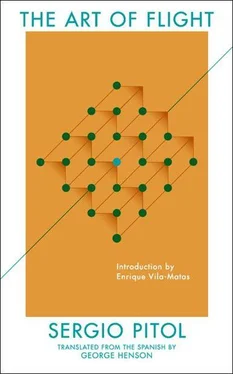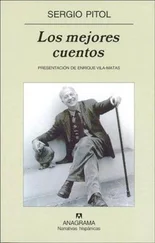Sergio Pitol - The Art of Flight
Здесь есть возможность читать онлайн «Sergio Pitol - The Art of Flight» весь текст электронной книги совершенно бесплатно (целиком полную версию без сокращений). В некоторых случаях можно слушать аудио, скачать через торрент в формате fb2 и присутствует краткое содержание. Год выпуска: 2015, Издательство: Deep Vellum, Жанр: Современная проза, на английском языке. Описание произведения, (предисловие) а так же отзывы посетителей доступны на портале библиотеки ЛибКат.
- Название:The Art of Flight
- Автор:
- Издательство:Deep Vellum
- Жанр:
- Год:2015
- ISBN:нет данных
- Рейтинг книги:5 / 5. Голосов: 1
-
Избранное:Добавить в избранное
- Отзывы:
-
Ваша оценка:
- 100
- 1
- 2
- 3
- 4
- 5
The Art of Flight: краткое содержание, описание и аннотация
Предлагаем к чтению аннотацию, описание, краткое содержание или предисловие (зависит от того, что написал сам автор книги «The Art of Flight»). Если вы не нашли необходимую информацию о книге — напишите в комментариях, мы постараемся отыскать её.
The first work in Pitol's "Trilogy of Memory," The Art of Flight imaginatively blends the genres of fiction and memoir in a Borgesian swirl of contemplation and mystery, expanding our understanding and appreciation of what literature can be and what it can do.
The Art of Flight — читать онлайн бесплатно полную книгу (весь текст) целиком
Ниже представлен текст книги, разбитый по страницам. Система сохранения места последней прочитанной страницы, позволяет с удобством читать онлайн бесплатно книгу «The Art of Flight», без необходимости каждый раз заново искать на чём Вы остановились. Поставьте закладку, и сможете в любой момент перейти на страницу, на которой закончили чтение.
Интервал:
Закладка:
29 JANUARY
During the day, I did nothing but read Mann’s diaries. His exile in Switzerland, the nervous crises that cause him to fear that he had plunged into madness. His comparison of the image of Germany and Germanness prevalent in the first section of the diaries (1918–21) and the second (1933–37) is rather interesting. On the 23rd of March of 1933, having just gone into exile, he writes: “At breakfast one of these necessarily unresolved talks with Katia about Germany and the terrifying side of its character.” The fact that Germany feigns possessing a different (and superior) fate than the rest of the world becomes an obsession for Mann. Already in the first section of the diaries he had written: “I am surprised to see that Jakob Schaffner had written that ‘the German people in the depth of their soul believe that its peculiarity in the world will never be understood or permitted; the German nation must exist in opposition to the world or it must cease to exist.’ This is exactly what I maintain in my Reflections , even though I express it differently.” This character of uniqueness defended in 1918 changes direction radically during his years of exile: “But this is the only nation in Europe that does not fear and abhor war; rather it deifies it,” he writes on 7 September, 1933. “Wretched, isolated, demented people, misled by a wild, stupid band of adventurers, whom they take for mythic heroes,” he notes on October 14 of the same year. “Rychner […] speaks of the isolation of Germany and her painful preoccupation with herself. For an analysis of this aspect of Germany, always out for different things from what the world needs, see Nietzsche,” he opines seven days later on October 21. That preoccupation, that rejection of the notion of a different fate for Germany, which he had so exalted in the past, will permeate Mann’s writing until his death. Germany’s loneliness in the world! The world’s inability to understand Germany! On January 11, 1934 he notes: “During our stroll at sunset I thought again about the novel about Faust. Such a symbol of the freedom of the character and fate of Europe will be, perhaps, not only happier but also more correct and adequate than an oratorical and condemnatory confession about the present.” 24Years later, he would add: “In the moving admiration of Leonard Frank [toward the first chapters of Doctor Faustus ] I sensed a kind of warning, of avoiding contributing with my novel the creation of a new German myth, praising the demonic character in Germans.”
30 JANUARY
To understand the range of elements that bubble in Mann’s Faustian cauldron, one only need look at the fragments of the diary that Mann incorporates in The Story of a Novel , the account of how he wrote Doctor Faustus . The vigor and curiosity of the old writer in exile are worthy of a titan. Those pages are testimony to the complexity of his endeavor. The annotations correspond to different orders: geographic, political, theological, medical, historical, musical, in addition to references to the political news of the day and to the tribulations and joys of family life and of his intimate group of friends: “Read an excellent article in The Nation , a piece by Henry James on Dickens. […] Written in 1864 at the age of twenty-two. Amazing! Is there anything like it in Germany? The critical writings of the West are far superior… Extensive reading of Niebuhr’s book, The Nature and Destiny of Man … Till after midnight reading in its entirety Stifter’s wonderful Rock Crystal . […] The coal miner strike, serious crisis. Government takeover of the mines. Troops to protect those willing to work — which will be few…Read some curious things on the inglorious defeat of the Germans in Africa. Nothing of Nazi fanaticism’s ‘to the last drop of blood…’Talking in the evening with Bruno Frank on the new strike wave here and the administration’s responsibility for it. Concern about the North American home front… Heaviest bombing of Dortmund, with more than a thousand planes. All Europe in invasion fever. Preparations of the French underground organization. Announcement of the general strike. The garrisons in Norway are instructed to fight ‘to the last man’—which never happens. In Africa 200,000 prisoners were taken. Superiority of materiel in quantity and quality explains the victory…Expectation of the invasion of Italy. Undertakings against Sardinia and Sicily are in the offing…In the evening read Love’s Labour’s Lost . The Shakespeare is pertinent. It falls within the magic circle — while around it sounds the uproar of the world. Supper with the Werfels and the Franks. Conversation on Nietzsche and the pity he arouses — for his and for more general desperation. Meetings with Schoenberg and Stravinsky planned…Calculations of time and age relationships in the novel, vital statistics and names…On Riemenschneider and his time. Purchases. Volbach’s Instrumentenkunde [a handbook on musical instruments]. Notes concerning Leverkühn as musician. His given name to be Anselm, Andreas, or Adrian. Notes on Fascist ideology of the period. Gathering at the Werfels with the Schoenbergs. Pumped S. a great deal on music and the life of a composer. To my deep pleasure, he himself insists that we all must get together more often….On May 23, 1943, a Sunday morning little more than two months after I had fetched out that old notebook, and also the date on which I had my narrator, Serenus Zeitblom, set to work, I began writing Doctor Faustus .” 25
1 FEBRUARY
Juan García Ponce published in 1972 an exceptional essay on Mann’s work: Thomas Mann Alive . It was published by Era. It is inexplicable to me that it has not been reissued. A book that critics, aspiring critics, everyone should study closely.
2 FEBRUARY
Mann’s anger is fierce, visceral, Olympian. He unleashes on a general target: Western democracies — particularly the French — during the first period; and Nazism during the second. He also returns to another topic in particular: the intellectuals who support these movements. During his exile he believes that the entire non-rationalist philosophical tradition is responsible for the tragedy Germany is experiencing. Even Bergson is accused of being a precursor of the Nazi model. Everything that sustains Mann’s work — instinct, the irrational, myth — ends up being frantically condemned by him in moments of desperation. Kundera says: “There is a fundamental difference in the way philosophers and novelists think. People talk about Chekhov’s philosophy, or Kafka’s or Musil’s, and so on. But just try to draw a coherent philosophy out of their writings! Even when they express their ideas directly, in their notebooks, the ideas are intellectual exercises, paradox games, improvisations, rather than statements of thought…” 26Indeed, there is an ongoing discussion in Mann’s great books — with others, with who he has been, and with who he is when he writes in his diary — but the novelist’s instinct transforms it, gives it another dimension, confers on it a different meaning. In a single diary entry he can state one idea and end up sustaining its opposite. All of this material, by the time it reaches the novel, will come out of chaos, will be coherent and cease being formless without losing the intensity it had in real life, that is, in the diaries.
3 FEBRUARY
All throughout the day I did nothing but read Mann’s diaries and take notes. Afterward, I read the autobiography of Klaus, his son, to compare each one’s version on certain episodes. I did not finish reading until after three a.m. Despite being tired, I was not able to fall asleep right away, so I took a higher dose of Lexotan than normal. The plot woven between their two lives overwhelmed me with sadness. The young Klaus’s thrilling ascent and his unhappy decline, his fragility, and the maddening upheaval of history are the elements of the story. The relationship between Klaus and his father is marked by darkness, bursts of passion, and distance. They seek and at the same time establish their distances. The son’s autobiography outlines his initial triumphs and his final anguish. The victories were short-lived; anguish, on the other hand, accompanied him for years. Let us consider Klaus’s diaries: “October 24, 1942: Terrible sadness. I want to die. October 25: I want to die. October 26: I want to die. How long will I be able to hold out? October 27: I want to die. I want to die. I want to die. Death seems the ideal solution. I would like to die. Life is unbearable for me. I have no desire to live. I want to die.” Five years later he would commit suicide after several failed attempts. In his diary, Thomas Mann embodies Settembrini, but also Naphtha. Sometimes both at the same time. What is remarkable is that he seems not to notice except in a chance moment, like when he reads the following words in an essay by Gide: “While in the war of 1914 the best of French thinkers fought alongside France, the best German thinkers rebelled against Prussia…” Mann is surprised, as if this included him, but not entirely. “That I have attempted, in Reflections, to contribute to and fight in favor of Prussianism is something that will remain ambiguous and strange, like an odd paradox.” Gombrowicz commented that his mother claimed a number of virtues, firmly convinced that she possessed them in full, when the truth was that in real life she possessed defects that were antagonistic to those virtues. Mann often speaks of his modesty, his life as a recluse, his exclusion from the world, when in fact his life constitutes a daily and ongoing relationship with fame. The slightest sense of failure is unbearable for him; it causes him to become ill. Photos from his exile in Switzerland bear witness to the everyday drama. His face, like all his faces, possesses something demented, distraught; they are faces of vampires, of possessed men. They are marked by insecurity. Years later in California, restoration, embellishment, and supreme elegance will all be regained. His work discipline is exemplary, admirable, and heroic throughout his life. Knowing that he is the owner of a word that others are anxiously awaiting — a single word to awaken or reassure his flock — gives him in due course a sense of continuity.
Читать дальшеИнтервал:
Закладка:
Похожие книги на «The Art of Flight»
Представляем Вашему вниманию похожие книги на «The Art of Flight» списком для выбора. Мы отобрали схожую по названию и смыслу литературу в надежде предоставить читателям больше вариантов отыскать новые, интересные, ещё непрочитанные произведения.
Обсуждение, отзывы о книге «The Art of Flight» и просто собственные мнения читателей. Оставьте ваши комментарии, напишите, что Вы думаете о произведении, его смысле или главных героях. Укажите что конкретно понравилось, а что нет, и почему Вы так считаете.












